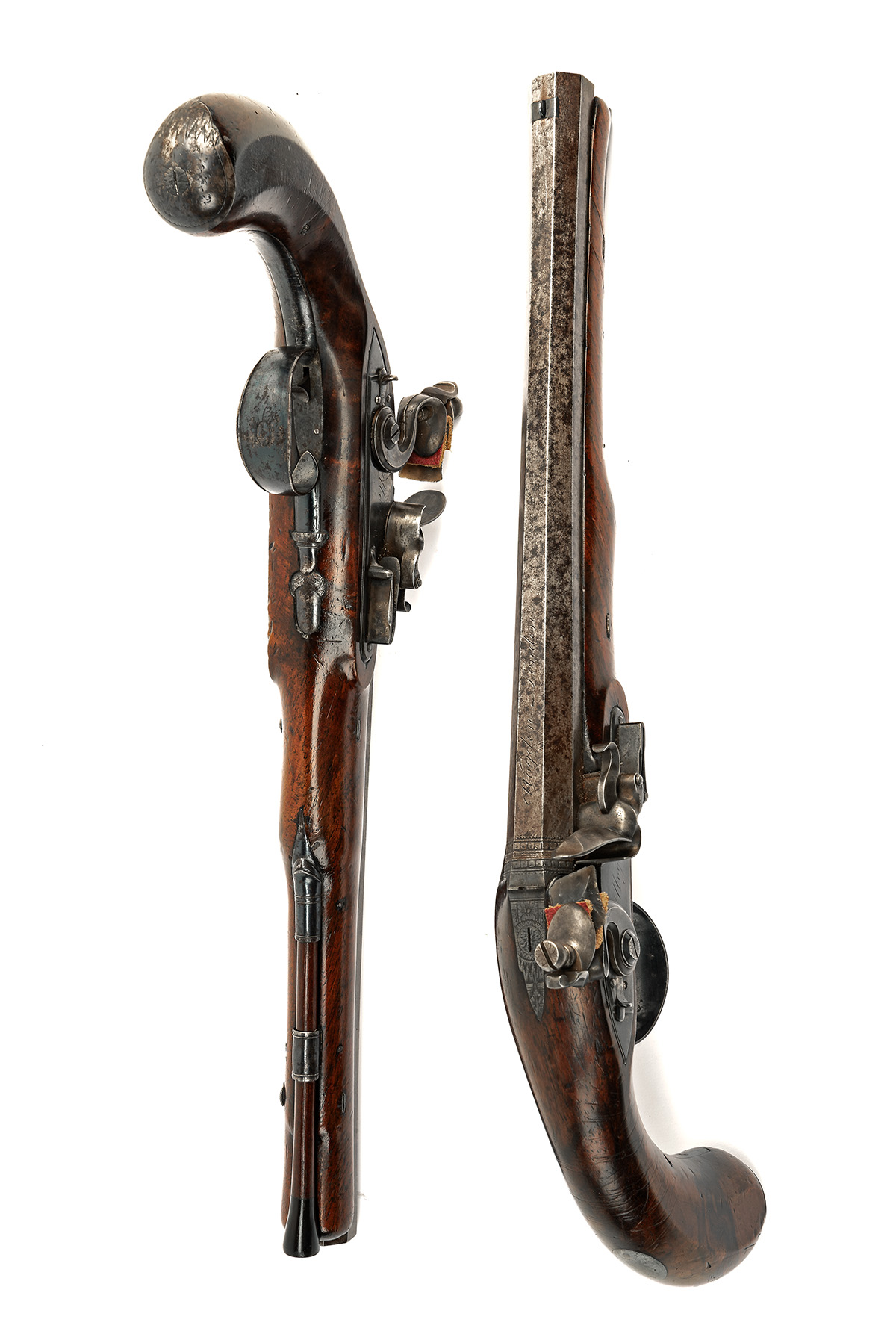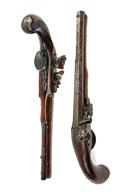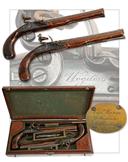Product Details
FORMERLY THE PROPERTY OF CAPT. MUNRO, 78TH (HIGHLANDERS) REGIMENT OF FOOT
WOGDON, LONDON
AN HISTORIC CASED PAIR OF 30-BORE FLINTLOCK DUELLING PISTOLS,
and by tradition used to fight one of the last documented duels on English soil, in 1843, the pistols manufactured circa 1795, with slightly swamped 10in. laminated octagonal barrels signed 'WOGDON, LONDON' on the top-flats, applied white metal fore-sights, twin engraved bands at breech, shallow standing notch rear-sights to front of the engraved top-tangs, plain locks with moulded edges, stepped tails, bolted safes behind the swan-necked cocks, rainproof pans with 'WOGDON' signature below (rubbed), walnut full-stocks with slab-sided bag-shaped grips (one pistol with repaired crack to fore-end), guarded single-set triggers, iron furniture, one pistol with horn-tipped mahogany ramrod, the other with iron mounted replacement, in their green baize lined makers mahogany case with leather covered flask, turnscrew with pricker, loading rod and scissors mould, the outer lid of case with flush-folding 'D' shaped handle and a brass escutcheon engraved 'CAPTN MUNRO, 78 HIGHLAND or ROSSHIRE BUFF REGT', and supplied with a period hand written note on the event and a printed account of the duel
Provenance: By popular tradition, Capt. Munro shot his Colonel, David Lynar Fawcett in a duel on July 1st, 1843 using these pistols. According to accounts of the time, two carriages were observed at a quarter to five in the morning by a policeman, S. Jones, driving past Camden Villas towards the Brecknock Arms Tavern. They stopped by the tollgate, and the toll-keeper saw five gentlemen alight, and headed off in parties of two and three into the ajoining fields. Ten minutes later, two gentlemen returned, boarded on of the carriages and drove off towards Regents Park. Even though no shots were heard, the toll-keeper said to the afore mentioned policeman that he thought a duel may have been fought. The pair investigated and found Lieutenant Colonel Fawcett of the 55th Regt. prostrate on the ground with two other men standing over him. The Colonel had been shot through the right side in the area of his chest. Initially he passed it off as an 'accident' but later confessed to his wife that the shooter was his brother in law, Lieutenant Alexander Thomas Munro of the Royal Horse Guards.
It transpired the duel was over a family dispute over property and that an argument over how the Colonel had handled Munro's affairs whilst Munro was away on service in China had broken out. Munro fled abroad to Belgium after the duel, but the other men involved were all arrested and charged with murder. Colonel Fawcett lived until July 3rd, where he expired from the wound received. The subsequent trial found all except Munro not guilty. Munro eventually returned to England four years later, where he was arrested. However, so many people attended his trial as favourable character witnesses that he was only sentenced to one year in prison, time he spent by popular account reading and writing letters.
After being released from prison, Munro repurchased his commission and took up a posting in Sligo as Barracks Master. In July 1855, Munro was appointed Barracks Master in Boyle, County Roscommon. In July 1863, he was Barracks Master in Richmond Barracks, Templemore, County Tipperary. Additionally, while the dates are unclear, he was also Barracks Master in Quebec, Canada.
Alexander died on 21 June 1867 at Stada Cona Villa, Military Road, Crinkill – just outside Parsonstown, it was possible he was acting as Barracks Master for Birr Barracks. His obituary mentions little about his career. At the time of his death cemeteries in Birr were in a terrible state, so he was interred at Seir Kieran, about 14 kilometers outside of Birr. Almost ironic that he was buried in the home county of his brother-in-law. In Alexander's will he left £200 pounds and all his effects to his wife Eliza.
The inscription on his now collapsed tombstone reads:
SACRED
to the memory of
Captain ALEXANDER THOMSON MUNRO
Barracks Master Quebec
and late of the Royal Horse Guards (Blue)
who died on the 21st June 1867
aged 64 years
We are gratefully indebted to the website barracksquare.ie for the above information
Please click HERE to view Terms & Conditions. Please note all Lots are listed in accordance with UK Law, for overseas buyers, please ensure you are familiar with your relevant local firearms and customs regulations before bidding.
Estimate £5,000-7,000










